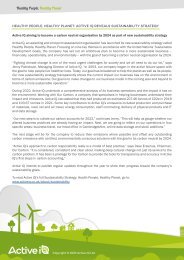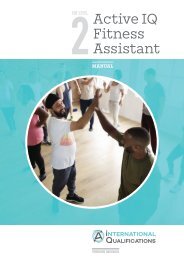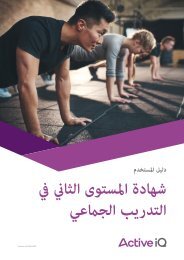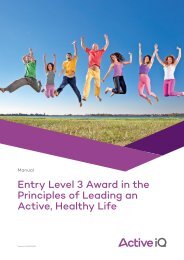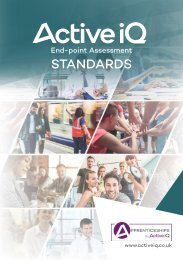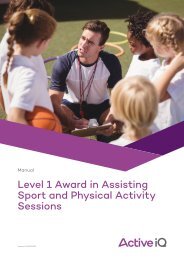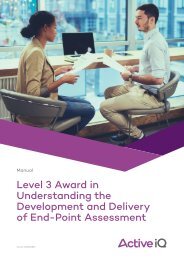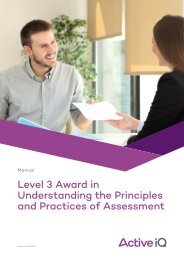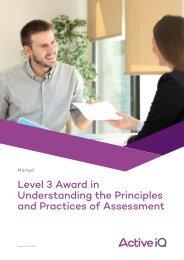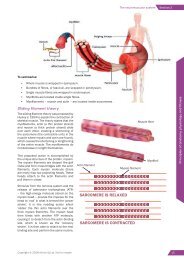Active IQ Level 3 Award in Assessing Competence in the Work Environment (sample manual)
You also want an ePaper? Increase the reach of your titles
YUMPU automatically turns print PDFs into web optimized ePapers that Google loves.
Plann<strong>in</strong>g assessment<br />
Section 3<br />
Risks associated with assessment<br />
<strong>Environment</strong>: The assessor should consider <strong>the</strong> nature of<br />
<strong>the</strong> assessment environment such as appropriate heat<strong>in</strong>g,<br />
ventilation, light<strong>in</strong>g and fire exits, as well as more hazardous<br />
environments for practical environments such as gymnastics<br />
halls or swimm<strong>in</strong>g pools.<br />
<strong>Environment</strong><br />
Assessment<br />
risks<br />
Activities: The assessor should pay attention to <strong>the</strong><br />
complexity of <strong>the</strong> tasks such as <strong>the</strong> length of time taken,<br />
whe<strong>the</strong>r learners are sitt<strong>in</strong>g or stand<strong>in</strong>g, concentration<br />
levels required and duration <strong>in</strong> <strong>the</strong> environment. Low-risk<br />
tasks like written exams will pose less risk than complex<br />
practical tasks such as weightlift<strong>in</strong>g demonstrations or<br />
mix<strong>in</strong>g chemicals.<br />
Activities<br />
People<br />
Pressure<br />
People: This risk presents <strong>the</strong> largest variable and <strong>the</strong> one<br />
most difficult to control; what is low risk to one <strong>in</strong>dividual may be<br />
high risk to ano<strong>the</strong>r. Age, fitness, gender and skill levels all pose<br />
a risk to physical or practical assessment, for example. More subtle<br />
differences, such as familiarity with an assessment environment, or <strong>the</strong><br />
effect of assessment on stress, can also affect <strong>the</strong> assessment process. O<strong>the</strong>r people <strong>in</strong>volved or exposed to <strong>the</strong><br />
assessment process can pose a risk if known to <strong>the</strong> learner or assessor, or if roles and responsibilities are not<br />
clearly def<strong>in</strong>ed and understood.<br />
Pressure: Undue psychological pressure on <strong>the</strong> learner can risk affect<strong>in</strong>g <strong>the</strong> quality of <strong>the</strong> assessment process,<br />
such as assess<strong>in</strong>g an <strong>in</strong>dividual who is not yet ready, sett<strong>in</strong>g unrealistic timescales, not adapt<strong>in</strong>g to reasonable<br />
adjustments, special considerations or <strong>in</strong>dividual needs. Pressure can also affect <strong>the</strong> assessor, with high numbers<br />
of learners to assess, pressure to meet atta<strong>in</strong>ment targets or fund<strong>in</strong>g, or pressure from <strong>the</strong> learner’s employers.<br />
Effective<br />
communication<br />
Careful<br />
plann<strong>in</strong>g<br />
Situations that could pose a risk <strong>in</strong>clude:<br />
Lower risk<br />
• A lack of confidence <strong>in</strong> <strong>the</strong> assessor to make correct decisions.<br />
• A lack of standardisation activities across <strong>the</strong> assessor workforce.<br />
• A learner copy<strong>in</strong>g ano<strong>the</strong>r’s work (plagiarism).<br />
• An assessor not consider<strong>in</strong>g a learner’s needs.<br />
• Us<strong>in</strong>g <strong>in</strong>appropriate assessment activities.<br />
• Assessors us<strong>in</strong>g lead<strong>in</strong>g questions or do<strong>in</strong>g <strong>the</strong> learners’ work for <strong>the</strong>m.<br />
• <strong>Award</strong><strong>in</strong>g organisations prescrib<strong>in</strong>g unsuitable assessment methods.<br />
• Employers not be<strong>in</strong>g supportive of assessment <strong>in</strong> <strong>the</strong> workplace.<br />
• Unhelpful and negative feedback to <strong>the</strong> learner.<br />
• Favouritism or bias towards selected learners.<br />
• Learners not be<strong>in</strong>g registered with <strong>the</strong> award<strong>in</strong>g organisation prior to assessment.<br />
• Unwelcome disruptions and <strong>in</strong>terruptions when assess<strong>in</strong>g.<br />
Understand<strong>in</strong>g pr<strong>in</strong>ciples and practice of assessment <strong>in</strong> education and tra<strong>in</strong><strong>in</strong>g<br />
Copyright © 2019 <strong>Active</strong> <strong>IQ</strong> Ltd. Not for resale 19




